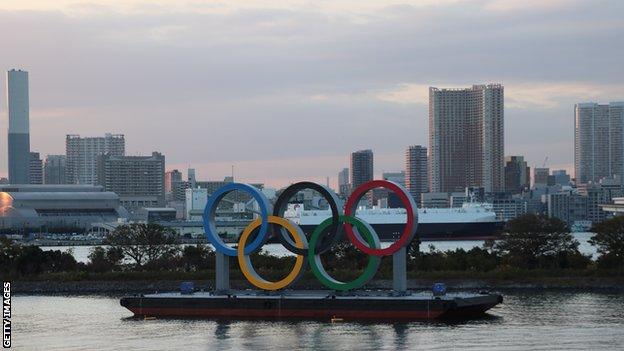Tokyo 2020: Olympic Games to maintain rules on athlete protests after survey
- Published

The Olympics are due to begin on 23 July and the Paralympics on 24 August
Protests by athletes, such as taking a knee, will still be banned at the Olympic Games.
The International Olympic Committee (IOC) had asked athletes in a survey whether its 'Rule 50' - which bans demonstrations - should change.
A total of 3,547 athletes were consulted, with 67% wishing to keep the Olympic podium free of protests and 70% keen to avoid on-field demonstrations.
The IOC said sanctions for those who breach the rule will now be considered.
'Rule 50' of the Olympic charter aims to stop protests and demonstrations in order to "protect the neutrality of sport and the Olympic Games".
Protests are prohibited on the podium, field of play or at ceremonies.
Kirsty Coventry, a two-time Olympic champion swimmer who chairs the IOC Athletes' Commission, said: "A very clear majority of athletes said that it's not appropriate to demonstrate or express their views on the field of play, at the official ceremonies, or on the podium, and so our recommendation is to preserve [those places] from any kind of protests and demonstrations or acts perceived as such.
"Being an Olympian, the field of play, the ceremonies were very specific and hold very specific memories in my heart. So if I think about when I was competing I wouldn't want something to distract and take away from that. That's how I still feel today."
The World Players Association, which brings together 85,000 athletes from 100 player associations across the world, criticised the decision.
"Human rights are not a popularity contest and they must urgently be embedded in the Olympic movement in line with expert recommendations," said executive director Brendan Schwab.
"Unless and until this occurs the human rights of vulnerable athletes will be at risk."
Global Athlete, the body led by Olympic champion cyclist Callum Skinner, said the IOC's approach is "archaic".
A Global Athlete statement said the decision was a "sign of an outdated sport system that continues to suppress athletes' fundamental rights".
"The competitors are humans first, athletes second," it added.
The Olympics are due to begin on 23 July, with the Paralympics set to start on 24 August.

The dark side of betting: Meet the man who stole millions from work to sustain his gambling habit
'Food is more than calories': Different strategies to help you achieve a healthy weight
